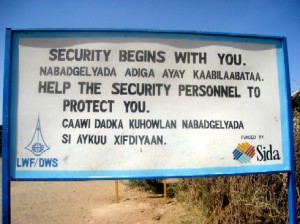
Volume 1, Issue 1 / December 2008
“I fight for justice over injustice.” These are the words spoken by Samuel Esianyen Lokumak, born in the Kakuma area of Turkana District in 1952. He is a chief elder, peace maker, and security officer for local and refugee communities.
Currently, Mr Lokumak works with the Chairman of the Peace Committee, Mr. Simon Lotuk Chegeu, in bridging the gap between refugees and the surrounding host community in Turkana District. The Peace Committee is facilitated by Lutheran World Federation (LWF) Peace Unit, and involves more than 200 refugees and locals in group get-togethers and discussions.
Mr. Lokumak states that he has been taking care of refugees, locals, and their properties since 1992. He arrests perpetrators holding arms and ammunitions within the area he is controlling. “In my day-to-day operations, I have 12 expert personnel who work with me to detect and identify perpetrators. Among those experts are my two children, the first child named Ebei and the second named Nawok,” explains Mr. Lokumak. Most perpetrators apprehended by Mr. Lokumak are locals from the local Turkana community. “They (armed perpetrators) are entering the refugee camp with the intent to rob or kill refugees,” states Mr. Lokumak.
He recounts his first experience with armed perpetrators in Kakuma Refugee Camp. “In 2001, I managed to catch six people armed with guns, but five of them ran away and I succeeded in remaining with one person holding two guns, both AK47s. I took the perpetrators along with their guns to the Kenyan Police for evidence.”
Mr. Lokumak also assisted to arrest perpetrators involved in an incident which took place in the Congolese Community on June 27th, 2008, in which a Congolese man was shot dead. “That was an operation carried out by local Turkana people,” states Mr. Lokumak. He recounts that after investigation and searching from Lokore Village, he caught two of the perpetrators involved in the incident. At the time of arrest, both perpetrators were holding AK47 guns. His strategic system of discovering the perpetrators was very simple, declares Mr. Lokumak. He followed the footsteps of perpetrators from the incident to their current location. “I gave those two names to the Kakuma Chief and reported to the Kenyan Police on 30th June, 2008,” confirms Mr. Lokumak.
Based on his years of experience, Mr. Lokumak is able to describe the layout of criminal operations around Kakuma Refugee Camp. He states that perpetrators live in the bush (remote countryside) with their guns. They have their people (locals) living within the camp, working and interacting with refugees on a day-to-day basis through transactions and business affairs. Some locals are even working as domestic help for refugees. These numerous contacts provide easy means of communication between locals and their fellow Turkanas living in the bush and holding guns. They may come together at night to rob and kill refugees. In such operations, armed perpetrators from the bush are guided by those working with refugees who have better knowledge of the refugees and their location.
Nowadays, Mr. Lokumak is accused by his fellow community members of disclosing their information. He will gain nothing by doing so, they say, and no one will pay him or care about his life. Even elders from the local community are blaming Mr. Lokumak for disclosing young boys to the Kenyan Police, where the boys are corrected and face long sentences in prison. Local elders tell Mr. Lokumak that the Sudanese are going back to their country and still he has gained nothing, so they do not understand why he continues wasting his efforts to mind about refugees while his countrymen are suffering.
To end his story, Mr. Lokumak comments that he is giving of his own time and energy to risk his life, while he receives neither payment nor encouragement. When he provides information he does not receive anything in return, while those receiving information benefit from this exchange. Unfortunately, he has no protection against the insecurity he faces from families of perpetrators. He complains that local government officials, his community, and UNHCR all stay quiet without offering him any assistance.
Mr. Lokumak finalizes his interview by giving a short account of his former career, saying that he was a soldier in Kitale in the 1960s and was shifted to Lodwar in 1970. It was here that he retired and then returned home to Kakuma Town, where he began working with Major Ngaira of UNHCR security.
